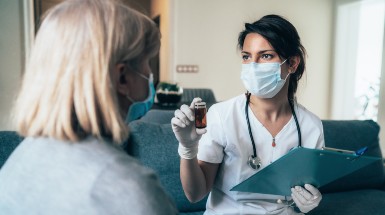National Institute for Health and Clinical Excellence (NICE)
|
|
Shared Learning Awards 2020 finalist: Prescribing guidelines for patients with a first episode psychosis
The Shared Learning Awards recognise the brilliant work being done to put NICE guidance and standards into practice in a range of organisations, including the NHS, local authorities, and the voluntary sector. The following work has been shortlisted for the NICE Shared Learning Awards 2020 and represents one of our three finalists.

Shared learning example submitted by: Dr Elizabeth Ewins, consultant psychiatrist for Bath and North East Somerset Early Intervention in Psychosis Team, Avon and Wiltshire Partnership Trust
Psychosis affects 1-3% of the population, this is higher than the incidence of diabetes in young people. A person’s experience of treatment during a first episode of psychosis is crucial and can have a lasting impact to their future attitudes about medication and compliance to and outcomes of treatment.
Avon and Wiltshire Mental Health Partnership Trust (AWP) serves a population of approximately 1.8 million people. Prescribing greatly varies for patients with a first episode of psychosis. The right medication needs to be chosen to reduce symptoms and then prevent relapse. This needs to be carefully balanced with the individual’s experiences of side effects, which can cause a person to stop taking a medication which in turn leads to relapse. A relapse can be incredibly distressing for the patient and their family, but also can mean additional time spent in psychiatric hospital. A person may have symptoms which are harder to treat and with lasting impacts on their ability to have a meaningful life, impacting on future care needs, with huge economic consequences.
After seeing this happen, Early Intervention in Psychosis Teams across AWP wanted to develop clear guidance for prescribers for people with a first episode of psychosis to ensure evidence-based best practice.
Using NICE guidance ‘Psychosis and schizophrenia in adults’ (CG178) and ‘Psychosis and schizophrenia in children and young people’ (CG155), and up-to-date research to set standards of prescribing, a Trust-wide audit confirmed that treatment of first episode of psychosis varied greatly. Often patients were not included in prescribing decisions and antipsychotics were being prescribed that could lead to detrimental long terms side effects.
The team consulted widely with prescribers across the Trust, pharmacists, the Trust Quality Improvement Team and Medicines Optimisation Group, and sought advice from Early Intervention teams across the country. The result was a set of guidelines to improve prescribing practices in both an inpatient and community setting.
The guidelines incorporate NICE recommendations as well as advice on evidence-based treatment options for prescribers. By providing this information, the guidance ensures that people with a first episode of psychosis are assessed correctly, and, where appropriate and agreed, started on a low dose second generation antipsychotic as part of an individualised treatment plan.
Feedback following the implementation of the new guidelines has been very positive. People with a first episode of psychosis feel more informed and aware of the different medication options available. With more person-prescriber involvement, compliance has increased and cessation of medication due to side effects has reduced. It is anticipated that this will lead to reduced rates of relapse and, as such, a reduction in time spent in hospital. The project did not incur any costs and proved to be cost saving for the Trust. In addition, other Trusts are also adopting the guidelines.
“This has been a fantastic opportunity to improve prescribing for patients with a first episode of psychosis, who are often young and never had medication before or an experience of mental health services. With input from the whole multidisciplinary team and Early Intervention in Psychosis teams across the country, we have produced evidence based prescribing guidelines to ensure that these vulnerable patients are not prescribed medication unnecessarily, are included in prescribing decisions and therefore more likely to take medication, and that we choose medications which will have fewer side effects or long term physical health effects. The guidelines have had a big impact on prescribing, saved money, and most importantly improved patient care,” Dr Liz Ewins, consultant psychiatrist for Bath and North East Somerset Early Intervention in Psychosis Team, Avon & Wiltshire Mental Health Partnership NHS Trust.
This work will be presented at the awards taking place virtually on Thursday 12 November, where the audience will be voting for the winner. Find out more about the event and how to register at www.nice.org.uk/news/events.
Read the full project summary here: https://www.nice.org.uk/about/what-we-do/into-practice/shared-learning-case-studies/shared-learning-awards/shared-learning-awards-2020/shared-learning-awards-2020-finalist---prescribing-guidelines-for-patients-with-a-first-episode-of-psychosis
Original article link: https://www.nice.org.uk/news/blog/shared-learning-awards-2020-finalist-prescribing-guidelines-for-patients-with-a-first-episode-psychosis


